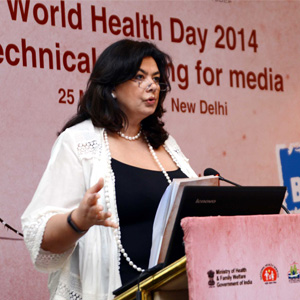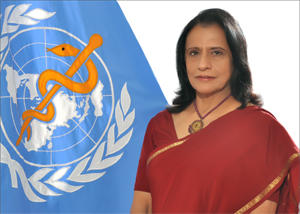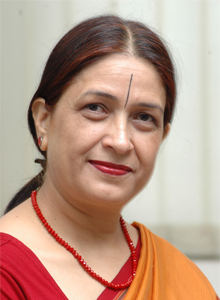
 Vector- borne diseases: a global burden
Vector- borne diseases: a global burden

Vector- borne diseases, the theme for this years World Health Day (WHD) is timely. Affecting more than half the worlds population and accounting for 17% global burden, these diseases are difficult to predict, prevent or control. In India, the burden and risk of vector-borne diseases (VBDs) is massive. Adding to the complexity is that VBDs have intensified in their severity due to climate and environmental change, and globalization. The WHD campaign, small bite: big threat, therefore, is well-timed as it brings renewed focus on sustainable control, elimination and eradication of VBDs.
The World Health Day aims at raising awareness about the threats posed by insect vectors and the bacteria, viruses, and parasites they carry, collectively known as vector-borne diseases (VBDs), and to motivate families and communities to protect themselves through simple measures. It also asks that not only must governments ensure that measures are in place for coordinated intersectoral actions, but also that citizens and communities are empowered in order to have an impact on prevention and control of VBDs.
Inefficient water management, rapid degradation of the environment, unplanned urbanization and other human determinants such as housing, climate changes, widespread poverty, air travel and ineffective health systems all play a role in contributing to spread of VBDs.

We also know that insect vectors that carry these diseases are very complex and versatile and can adapt themselves quickly to the changing environment, which makes the task of controlling these diseases even more difficult.
For most VBDs, no vaccine is available, leading to a large number of deaths, especially in children under Five years in countries with extreme poverty. In addition, VBDs result in loss of productivity, school absenteeism, deeper impoverishment and higher health care costs, leading to an increased to an increased burden on public health services.
Dr. Nata Menabde, WHO Representative to India

Dengue and malaria impacting socioeconomic growth: WHO
While countries in South-East Asia have made substantial economic progress, diseases such as dengue and malaria fuel a vicious cycle of poverty and have a significant impact on socioeconomic status of communities. These diseases are still killing thousands of people in the WHO South-East Asia Region. On World Health Day“ 7 April “ the World Health Organization is urging countries to prevent and control vector-borne diseases including chikungunya, dengue, kala-azar, lymphatic filariasis and malaria, among others.
Forty percent of the global population at risk of malaria lives in the WHO South-East Asia Region “ home to a quarter of the worlds population. Malaria is endemic in 10 of the 11 countries of the Region: Bangladesh, Bhutan, Democratic Peoples Republic of Korea, India, Indonesia, Myanmar, Nepal, Sri Lanka, Thailand and Timor-Leste. Maldives is the only country in the Region that has remained free of malaria (malaria-free since 1984). SriLanka made remarkable progress in controlling malaria by bringing cases down from 203 000 in 2000 to zero locally acquired malaria cases since November 2012.
These are deadly but preventable diseases. The solution lies in a united and sustained effort from all of us. Ministries of health alone cannot control these diseases. Their control and prevention needs committed engagement from all sectors, strong political will and active community participation, said Dr Poonam Khetrapal Singh, WHO Regional Director for South-East Asia. This Region recently defeated polio, it is time for us to show the same resolve to defeat malaria, dengue and other vector- borne diseases, she added.
Vector-borne diseases account for 17% of the estimated global burden of all infectious diseases. Dengue is now the worlds fastest growing vector-borne disease, with a 30-fold increase in disease incidence over the past 50 years. Outbreaks of dengue fever have now been reported from all countries in WHOs South-East Asia Region except Democratic Peoples Republic of Korea.
Lymphatic filariasis, another mosquito-borne disease, is linked to poverty and creates disfiguring and social stigma. The Region has 60 million infected people while 875 million people are at risk of infection. To interrupt transmission, WHO recommends an annual mass drug administration of single doses of two medicines to all eligible people in endemic areas.
With mass drug administration with effective coverage, there is no reason why diseases like lymphatic filariasis cannot be eliminated from the Region, said Dr Poonam Khetrapal Singh. Countries must prioritize vector-borne diseases in their national development agendas. Communities need to be empowered to fight this battle and protect themselves. Preventing and controlling vector-borne diseases is everyones responsibility, she added.
Dr.Poonal Khetrapal Singh, Regional Director, WHO SEARO
 Living in the midst of disease
Living in the midst of disease
The vector borne diseases are a menace especially in the developing world. Although the scenario is fast evolving and changing for the better, developing countries like India are the lands of paradoxes. While at one end ,there are centers of excellence that can match up with the best in the world, primary health care to all is still an issue. The good news is that these are preventable diseases but the bad news is that we are doing little about them.
Prof Chintamani,President, The Association of Breast Surgeons of India, Vardhman Mahavir Medical College Safdarjung Hospital, New Delhi
 Dual Epidemic of Diseases
Dual Epidemic of Diseases
Currently, developing countries, especially India, is facing a dual epidemic of diseases. While communicable diseases including vector-borne diseases remain un-contained, there is a rapidly rising scourge of non-communicable diseases, particularly diabetes and heart diseases. It is important that each and every Indian, whether in rural or urban areas, should know about these diseases and how to prevent them. For this, dissemination of knowledge should start at primary school level. Teaching children a healthier way of life and protection against future diseases should be the focus of the Indian health policy.”
Prof. (Dr.) Anoop Misra, Chairman, Fortis C-DOC Centre of Excellence for Diabetes, Metabolic Diseases & Endocrinology
 Constant Hazard
Constant Hazard
Vector borne diseases such as malaria and dengue represent a constant hazard to all Indians, given our poor sanitation infrastructure and inadequate public health and hygiene standards. Prevention is the best form of treatment, which is why you need to empower yourself with Information Therapy. This will help you to improve the health of your community , in partnership with your doctor. Becoming an expert patient pays rich dividends !
Dr Aniruddha Malpani, MD Medical Director,HELP “ Health Education Library for People, Mumbai
 Time to define strategy
Time to define strategy
It is an irony that over one million people in the world die every year due to vector borne diseases. It is quite considerable that the WHO is taking cognition and focussing on Prevention of Vector Borne Diseases on this World Health Day.
We as a country like India, boasts of five-star healthcare facilities in metropolitan cities but the fact remains that infectious diseases like malaria and dengue are still one of the leading causes of mortality.
Challenges of such magnitude need collective efforts of each citizen, the NGOs and the government bodies. The time has come to define a clear strategy with key milestones and well-defined monitoring parameters for implementation and mid- course correction for achieving targeted goals.
Dr. Vikram Singh Raghuvanshi, Chief utive – Healthcare, Jaypee Hospital (Noida)
 Greatest Contributors to human mortality
Greatest Contributors to human mortality
The most deadly vector-borne disease, malaria, caused an estimated 660 000 deaths in 2011. The Vector-borne diseases are one of the greatest contributors to human mortality and morbidity in tropical settings and beyond. The diseases that are spread by vectors kill a million people every year and more than half of the world is at risk for the same.
It should be noted that the world’s fastest growing vector-borne disease is dengue, with a 30-fold increase in disease incidence over the last 50 years. Globalization of trade and travel and environmental challenges such as climate change and urbanization are having an impact on transmission of vector-borne diseases, and causing their appearance in countries where they were previously unknown.
In our country, we have a large rural as well as slum population, which needs constant awareness in taking precautions and preventive measures for the same. We can protect ourselves and our families by taking simple preventive measures, including vaccination.
Dr.Dharminder Nagar, Managing Director, Paras Healthcare
 A major threat
A major threat
Vector-borne diseases are a major threat to the Indian public health. The need of the hour is to be aware of your surroundings and adopt an accurate strategy, starting from the diagnosis, treatment to the prognosis. With summers just round the corner, cases of mosquito- borne diseases like Dengue, Malaria and Chikungunya are bound to make a comeback if a decisive strategy is not put in place in advance, at the local and national level.
Dr. Anurag Bansal, Medical Director, Quest Diagnostics
 Molecular testing
Molecular testing
Prevention, Diagnosis, Treatment and Outcomes in cancer rest today on the shoulders of Molecular Diagnosis. Precision and up–to–date cancer care is impossible without the contribution of this Life Science. We need to incorporate Molecular testing into our lives now not later.
DR SAMEER KAUL President BREAST CANCER PATIENTS BENEFIT FOUNDATION & Senior Consultant Head, Surgical Oncology Unit APOLLO CANCER INSTITUTE
 Need to reduce maternal mortality
Need to reduce maternal mortality
Good maternal health determines the wellbeing of the entire family. We must continue our crusade to reduce maternal mortality and morbidity in our country .
Dr Anita Kaul Chief, Apollo Centre for Fetal Medicine , New Delhi
 Health is wealth
Health is wealth
Today is 7th April and generally we celebrate this day as World Health Day. On this special occasion, I would like to bring this to your notice, that a large number of people are getting affected from Diabetes, Hypertension, Heart-diseases and Obesity.Main reason behind these diseases is bad lifestyle and a casual behavior towards health. Let all of us, on this day take an oath that we will improve our lifestyle and will do daily exercise to live a healthy life. After all Health is Wealth and that will be a real celebration of World Health Day when we all live healthy.
Dr Munish Prabhakar,Sr consultant Physician, Diabetes and Preventive Cardiology. Medical Director Privat Hospital Gurgaon.
 Nurses play a role
Nurses play a role
Vector borne diseases have long been a major cause for human mortality and morbidity worldwide. According to Gubler, 1998, in the 19th and 20th century, human morbidity and mortality due to vector-borne diseases outstripped that from all other causes combined.
Cases of illness and death on account of vector-borne diseases are continuously on the rise, to mention, the legendary filmmaker Yash Chopra died of dengue last year. As per the statistics, more than 70,000 cases of dengue were reported across India last year. Over 2.5 billion people, nearly 40 per cent of world population is now at risk from dengue. The situation with other vector-borne diseases like malaria, filaria, etc is even more daunting.
Nurses, as pivotal health team member must actively involve themselves in creating awareness among people regarding VBD and precations for protection.
Dr Manju Chhugani,Principal, Rufaida College of Nursing, Jamia Hamdard
 NATHEALTH is committed to help
NATHEALTH is committed to help
India bears a significant burden of vector-borne diseases, contributing to 34 per cent of global dengue and 11 per cent of global malaria cases..On the other hand,rising incidence of non-communicable diseases will adversely impact the Indian economy,to the extent of 230 billion INR in a decade! Our Country is engaged in battling the dual burden of communicable and non-communicable diseases simultaneously, which developed countries have had to deal with only sequentially! Therefore the theme for World Health Day 2014,Vector-borne Diseases, is as relevant for India as was last years theme of High Blood Pressure. NATHEALTH is committed to help address these critical needs.
Anjan Bose, Secretary General,Healthcare Federation of India(NATHEALTH)
 Health for all
Health for all
It is a great opportunity to feel part of WHO days celebration. The theme is very apt for my country. We are a land of paradoxes; at one end of the spectrum are some of the richest people of the world while we are struggling to prevent vector borne diseases in this country. I dream of a future where the Alma Ata Declaration Health for All by 2000 AD would finally come true.
Sukriti Rastogi, Vardhman Mahavir Medical College & Safdarjung Hospital, New Delhi
Be a part of Elets Collaborative Initiatives. Join Us for Upcoming Events and explore business opportunities. Like us on Facebook , connect with us on LinkedIn and follow us on Twitter , Instagram.












